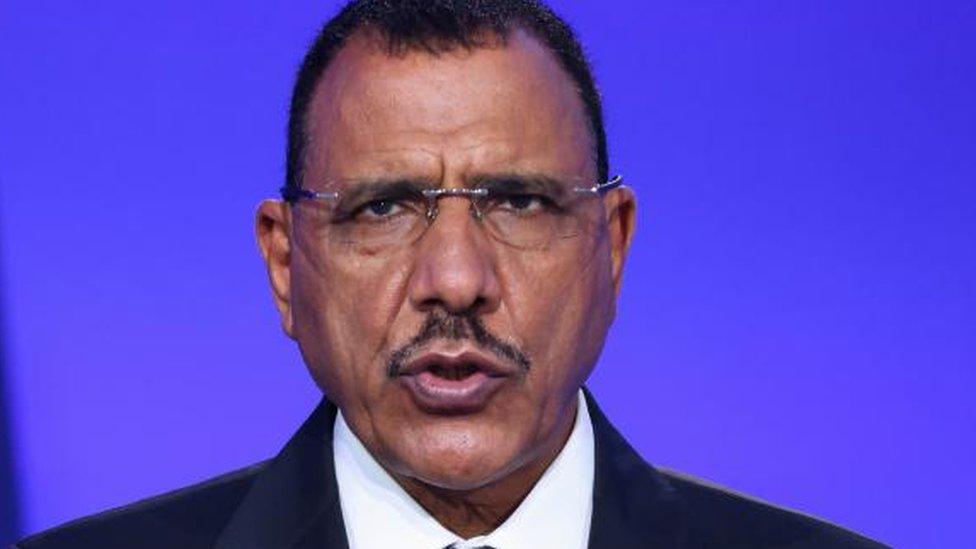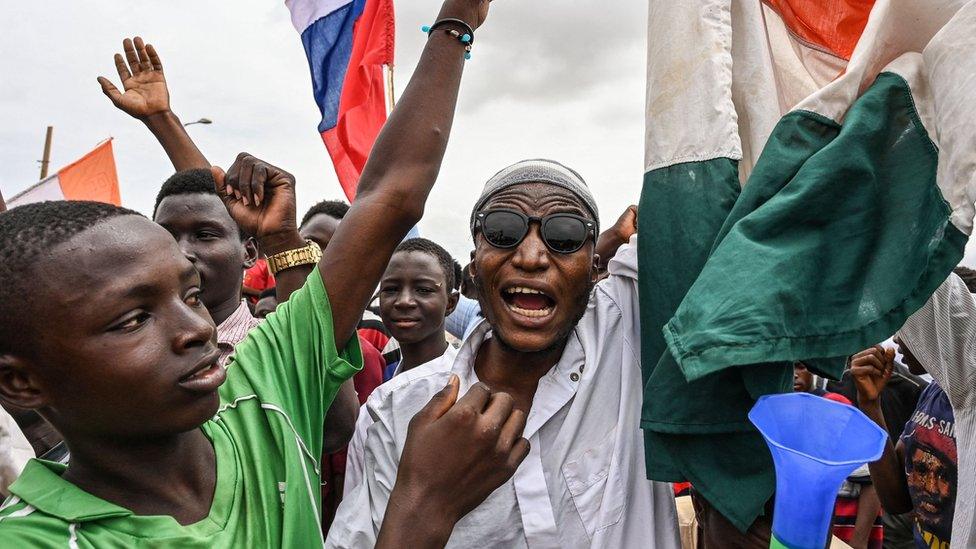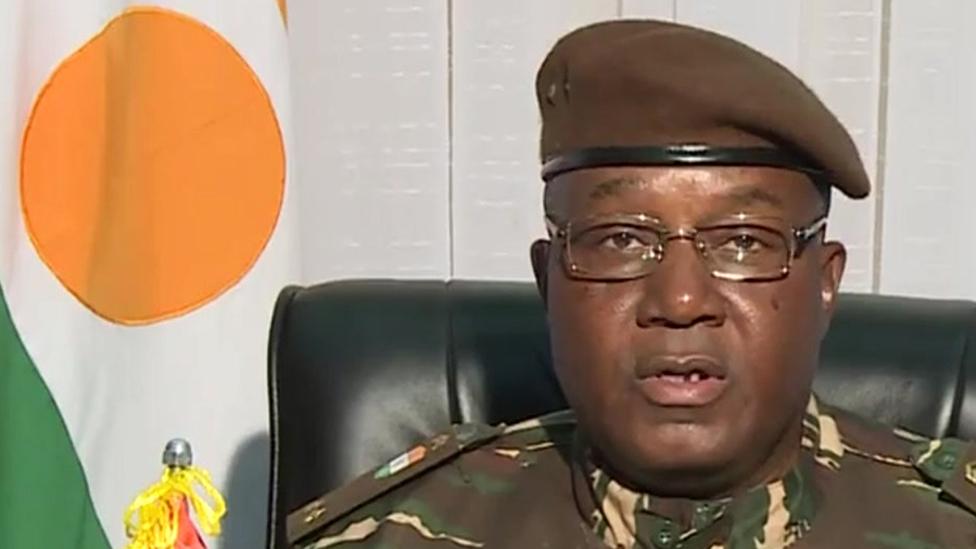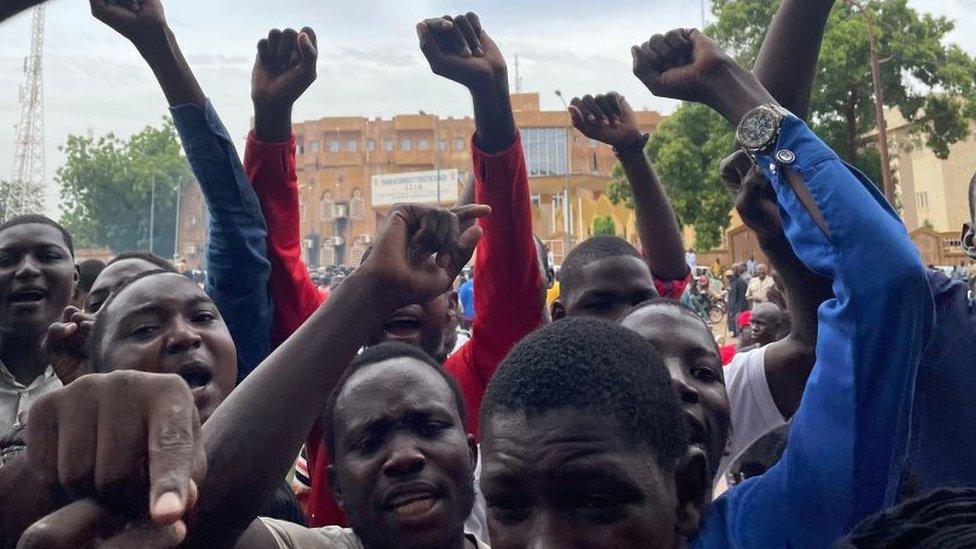Niger coup: Ousted President Bazoum to be charged with high treason, junta says
- Published

Mohamed Bazoum was toppled as president more than two years after he took office
Niger's military junta has announced plans to prosecute deposed President Mohamed Bazoum for high treason and undermining national security.
This is the latest sign that the junta intends to resist international pressure to return power to Mr Bazoum.
The West African regional bloc Ecowas said it was shocked to learn that the junta wanted to prosecute him.
He has been held in the basement of his palace since the military staged a coup about three weeks ago.
Mr Bazoum was in "good spirits" despite being held in "difficult" conditions, his doctor said after a visit.
Saturday's visit was approved amid growing international demands for Mr Bazoum's release.
The US State Department expressed its dismay that the Niger leader had been charged, with spokesperson Vedant Patel describing the charges as "completely unwarranted and unjustified".
Mr Patel said they would not "contribute to a peaceful resolution of this crisis", and said they were a "further affront, in our opinion, to democracy and justice and to the respect of the rule of law."
But in a sign that it is hardening its position, the junta said in a statement read out on state TV that it had gathered evidence to prosecute "the deposed president and his local and foreign accomplices for high treason and undermining the internal and external security of Niger".
It did not give further details.
Mr Bazoum, 63, is being held captive with his wife and son and there were growing concerns about their health.
Gen Abdourahmane Tchiani, the head of the presidential guards unit, declared himself Niger's new ruler on 26 July after overthrowing him.
Ecowas has threatened military action to reverse the coup, but it has so far failed to follow through on its threat.
The coup leaders have warned they will defend themselves against any intervention.
Ecowas has also imposed sanctions on the junta, including cutting electricity to Niger. This has caused blackouts in the capital Niamey, and other major cities.
Ecowas said the move to prosecute Mr Bazoum was a new form of provocation which contradicted the military's reported willingness to find a peaceful solution to the crisis.
On Saturday, a high-powered delegation of Muslim clerics from neighbouring Nigeria met junta leaders in Niamey in a bid to mediate an end to the crisis.
Junta-appointed Prime Minister Ali Mahamane Lamine Zeine said he was optimistic that talks with Ecowas would take place in the coming days "to discuss how the sanctions against us will be lifted".
The coup in Niger mirrored similar takeovers in neighbouring Burkina Faso and Mali, amid an Islamist insurgency and a growing Russian influence in the wider Sahel region through its mercenary group Wagner.
Despite his captivity, Mr Bazoum was able to publish an article in The Washington Post, external stating that he was a hostage and that the coup would have "devastating consequences for our country, our region and the entire world".
Mr Bazoum is reported to have lost a "worrying" amount of weight, while his 20-year-old son, who has a chronic medical condition, was also reportedly denied care.
UN human rights chief Volker Turk described the conditions of the detention as inhumane, degrading and in violation of international human rights law.
His daughter Zazia, 34, who was on holiday in France during the coup, told the UK-based Guardian newspaper last week that her father, mother and brother had no clean water or electricity and were living on rice and pasta.
Fresh food was rotting in the fridge because there was no power, she said.
The deputy director at Human Rights Watch Africa, Carine Kaneza Nantulya, also told the BBC that they were concerned the charges may be politically motivated.
"In terms of the potential charge that has been talked about we're also concerned that this might be a politically motivated charge, given the length and the nature of President Bazoum's detention and the other co-detainees", she added.
Mr Bazoum has been seen once since he was overthrown, in a photo released after he met Chad's leader Mahamat Idriss Déby Itno.
Mr Déby met both the junta and Mr Bazoum soon after the coup in a failed bid to resolve the crisis.
Related topics
- Published12 August 2023

- Published10 August 2023

- Published28 July 2023
